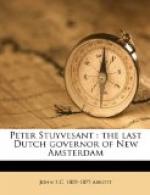This petition was speedily followed by vigorous measures, which were undoubtedly countenanced, if not authorized, by the Connecticut authorities. One Richard Panton, “whose commission was his sword and whose power his pistol,” threatened the people of Flatbush and other Dutch villages in the neighborhood, with the pillage of their property unless they would take the oath of allegiance to the Hartford government and take up arms against the Dutch provincial authorities.
Such were the news which first greeted Governor Stuyvesant when he returned, not a little dispirited, from his unsuccessful mission to Boston. He was fully aware that he could bring forward no physical power which could resist the encroachments of his unscrupulous neighbors. He had no weapon to which he could resort but diplomatic skill. He accordingly immediately sent a deputation of four of his principal men to Hartford, still to make another attempt with the authorities there to settle the boundary question, “so that all further disputes may, for the welfare of our mutual subjects, be prevented.”
The commissioners sailed from New Amsterdam and after two days landed at Milford. Thence they took horses and rode to New Haven, where they passed the night. The next day they rode to Hartford. The road through the almost unbroken wilderness was rough and the journey very fatiguing. It took our fathers four days to traverse the space over which we can now easily pass in four hours. The General Assembly at Hartford appointed three persons as a committee of conference to meet the delegation from New Amsterdam. A long negotiation followed. John Winthrop, son of Governor Winthrop of Massachusetts, was then governor of Connecticut. He seems to have been the worthy son of his noble sire. His sense of justice disposed him to respect the claims of the Dutch delegation. He admitted that the patent issued by the king of England could by no justice rob the Dutch of their territory, and that it was not so intended. But the Hartford commissioners were inexorable. “The opinion of the governor,” they said,
“is but the opinion of one man. The grant of the king of England includes all the land south of the Boston line to Virginia and to the Pacific Ocean. We do not know any New Netherland, unless you can show a patent for it from the king of England.”
“But did you not,” said the Dutch delegates
“agree by the treaty of 1650, that the boundary line on Long Island should run from the western part of Oyster bay straight across the island to the sea; and that the land east of that line should belong to the English and west to the Dutch?
“And did you not agree that, on the mainland, the boundary line between the Dutch and English possessions should begin upon the west side of Greenwich bay, running twenty miles into the unknown interior, and that the region west of that should belong to the Dutch?”
The emphatic reply to those questions was,




